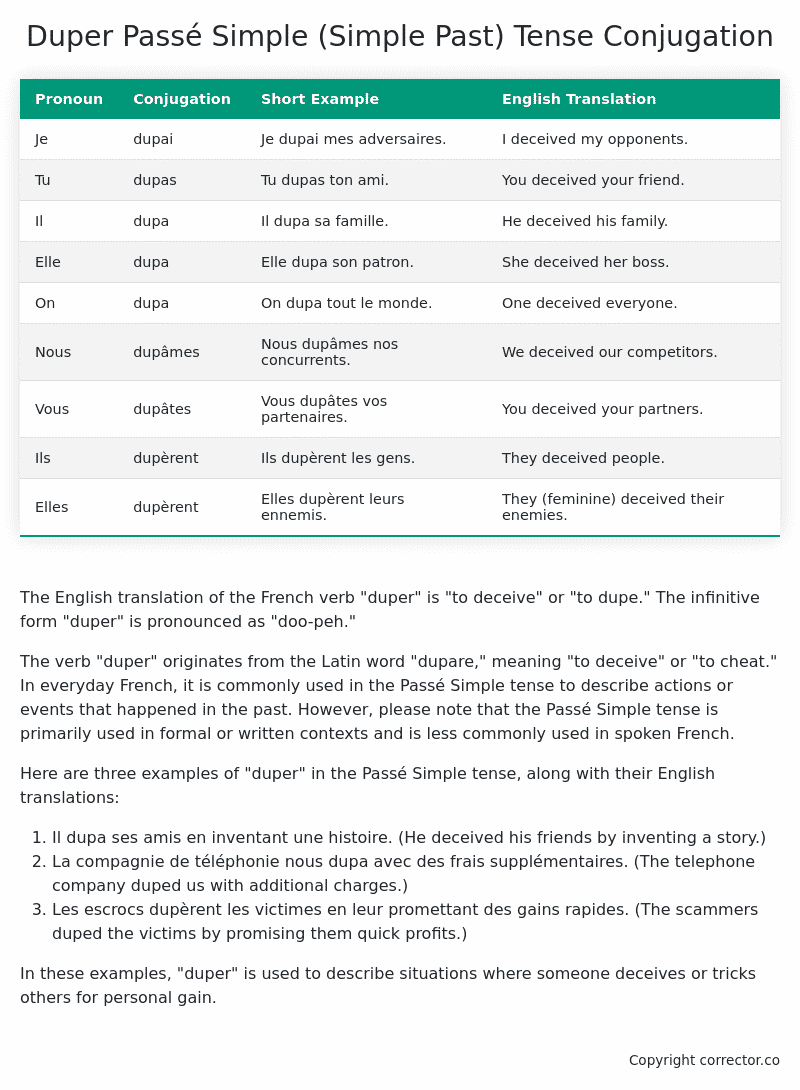Passé Simple (Simple Past) Tense Conjugation of the French Verb duper
Introduction to the verb duper
The English translation of the French verb “duper” is “to deceive” or “to dupe.” The infinitive form “duper” is pronounced as “doo-peh.”
The verb “duper” originates from the Latin word “dupare,” meaning “to deceive” or “to cheat.” In everyday French, it is commonly used in the Passé Simple tense to describe actions or events that happened in the past. However, please note that the Passé Simple tense is primarily used in formal or written contexts and is less commonly used in spoken French.
Here are three examples of “duper” in the Passé Simple tense, along with their English translations:
- Il dupa ses amis en inventant une histoire. (He deceived his friends by inventing a story.)
- La compagnie de téléphonie nous dupa avec des frais supplémentaires. (The telephone company duped us with additional charges.)
- Les escrocs dupèrent les victimes en leur promettant des gains rapides. (The scammers duped the victims by promising them quick profits.)
In these examples, “duper” is used to describe situations where someone deceives or tricks others for personal gain.
Table of the Passé Simple (Simple Past) Tense Conjugation of duper
| Pronoun | Conjugation | Short Example | English Translation |
|---|---|---|---|
| Je | dupai | Je dupai mes adversaires. | I deceived my opponents. |
| Tu | dupas | Tu dupas ton ami. | You deceived your friend. |
| Il | dupa | Il dupa sa famille. | He deceived his family. |
| Elle | dupa | Elle dupa son patron. | She deceived her boss. |
| On | dupa | On dupa tout le monde. | One deceived everyone. |
| Nous | dupâmes | Nous dupâmes nos concurrents. | We deceived our competitors. |
| Vous | dupâtes | Vous dupâtes vos partenaires. | You deceived your partners. |
| Ils | dupèrent | Ils dupèrent les gens. | They deceived people. |
| Elles | dupèrent | Elles dupèrent leurs ennemis. | They (feminine) deceived their enemies. |
Other Conjugations for Duper.
Le Present (Present Tense) Conjugation of the French Verb duper
Imparfait (Imperfect) Tense Conjugation of the French Verb duper
Passé Simple (Simple Past) Tense Conjugation of the French Verb duper (You’re reading it right now!)
Passé Composé (Present Perfect) Tense Conjugation of the French Verb duper
Futur Simple (Simple Future) Tense Conjugation of the French Verb duper
Futur Proche (Near Future) Tense Conjugation of the French Verb duper
Plus-que-parfait (Pluperfect) Tense Conjugation of the French Verb duper
Passé Antérieur (Past Anterior) Tense Conjugation of the French Verb duper
Futur Antérieur (Future Anterior) Tense Conjugation of the French Verb duper
Subjonctif Présent (Subjunctive Present) Tense Conjugation of the French Verb duper
Subjonctif Passé (Subjunctive Past) Tense Conjugation of the French Verb duper
Subjonctif Imparfait (Subjunctive Imperfect) Tense Conjugation of the French Verb duper
Subjonctif Plus-que-parfait (Subjunctive Pluperfect) Tense Conjugation of the French Verb duper
Conditionnel Présent (Conditional Present) Tense Conjugation of the French Verb duper
Conditionnel Passé (Conditional Past) Tense Conjugation of the French Verb duper
Conditionnel Passé II (Conditional Past II) Tense Conjugation of the French Verb duper
L’impératif Présent (Imperative Present) Tense Conjugation of the French Verb duper
L’impératif Passé (Imperative Past) Tense Conjugation of the French Verb duper
L’infinitif Présent (Infinitive Present) Tense Conjugation of the French Verb duper
L’infinitif Passé (Infinitive Past) Tense Conjugation of the French Verb duper
Le Participe Présent (Present Participle) Tense Conjugation of the French Verb duper
Le Participe Passé (Past Participle) Tense Conjugation of the French Verb duper
Struggling with French verbs or the language in general? Why not use our free French Grammar Checker – no registration required!
Get a FREE Download Study Sheet of this Conjugation 🔥
Simply right click the image below, click “save image” and get your free reference for the duper Passé Simple tense conjugation!

Duper – About the French Passé Simple (Simple Past) Tense
Formation
Usage
Narration
Historical Context
Interactions with other tenses
Passé Composé
Imparfait
Conditional and Subjunctive
Summary
I hope you enjoyed this article on the verb duper. Still in a learning mood? Check out another TOTALLY random French verb conjugation!


